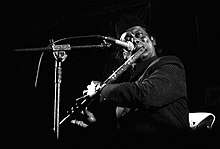Bari Siddiqui
Bari Siddiqui (15 November 1954 – 24 November 2017)[1] was a Bangladeshi singer-songwriter, flutist, and eminent folk musician.[2] He is widely known as the singer of the heartfelt "Shua Chan Pakhi", "Amar Gaye Joto Dukkho Shoy," “Pubali Batashe," and "Manush Dhoro Manush Bhojo". He was considered as one of the most popular folk singers in Bangladesh.[3]
Bari Siddiqui বারী সিদ্দিকী | |
|---|---|
 Siddiqui at a concert in SUST campus (2012) | |
| Background information | |
| Born | 15 November 1954 Netrokona, East Bengal, Dominion of Pakistan |
| Died | 24 November 2017 (aged 63) Dhaka, Bangladesh |
| Genres | Folk, classical |
| Occupation(s) | Singer |
| Instruments | Flute |
| Years active | 1981–2017 |
Early life
Siddiqui was born as Abdul Bar Siddiqui on 15 November 1954 in Netrokona.[4] He got his formal vocal training at the age of 12 under Gopal Dutt of Netrokona. Since 1981, Bari took lessons for six years under Ustad Aminur Rahman. He later got professional tutelage under V. G. Karnaad in Pune, India.[5]
Siddiqui completed his intermediate study from Netrakona Govt College and earned his bachelor degree from the University of Dhaka. He joined Bangladesh Television in about 1985.[5]
Career
Siddiqui made his first television appearance in 1995 on Ronger Baroi, a musical program produced by Humayun Ahmed who was considered as one of the patronizers of him. He came to mainstream with the release of Humayun Ahmed's film Srabon Megher Din (1999).[6] For his song "Shua Chan Pakhi" in the movie Srabon Megher Din, he was awarded the Bachsas Award as the Best Male Playback Singer.[7]
Siddiqui had a very deep and vibrating voice that enticed millions of Bengali speaking people around the world. The main features of his songs were pain, love, human life, and existence. These features were sparkled in his voice. He always used to play his flute during a performance. This folk maestro has voice around 160 tracks in his career[3] and released a folk album titled Lokhkho Tara in April 2000.[3][5]
Siddiqui appeared in the drama "Pagla Ghora," directed by Amol Palekar, in 2013 to extend his artistic quest.[3]
Personal life
Siddiqui's wife Farida Yeasmin, they had one daughter Elma Siddiqui and two sons.[8][9]
Death and Legacy
Siddiqui was admitted to Square Hospital in Dhaka on 17 November 2017, when he was suffering from a heart disease. He died on 24 November under treatment.[10][11]
To continue his legacy and the Baul tradition of music, Siddiqui established a Baul research centre, "Baul Bari," near his village in Netrokona.[3]
References
- "Eminent folk singer, flautist Bari Siddiqui passes away". bdnews24.com (in Bengali). Retrieved 24 November 2017.
- Zahangir Shah (31 May 2011). "Bari Siddiqui Performance in Manikganj". The Daily Star. Manikganj. Retrieved 8 July 2017.
- "An ode to Bari Siddiqui". Dhaka Tribune. 24 November 2017. Retrieved 29 July 2019.
- "Bari Siddiqui". IMDb. Retrieved 29 July 2019.
- Sadya Afreen Mallick (14 January 2009). "Bari Siddiqui unplugged". The Daily Star. Retrieved 8 July 2017.
- "Bari Siddiqui on life support". The Daily Star. 19 November 2017. Retrieved 19 November 2017.
- Zahangir Alom (15 November 2015). "A Medley of Soul-searching Melodies". The Daily Star. Retrieved 8 July 2017.
- Aminul Islam (24 May 2016). "Bari Siddiqui performs in Mymensingh". The Daily Star. Retrieved 8 July 2017.
- "বারী সিদ্দিকী মারা গেছেন". bdnews24.com (in Bengali). Retrieved 23 November 2017.
- "Folk singer Bari Siddiqui no more". Prothom Alo. Archived from the original on 26 November 2017. Retrieved 24 November 2017.
- প্রখ্যাত সঙ্গীতশিল্পী বারী সিদ্দিকী আর নেই. Kaler Kantho (in Bengali). Archived from the original on 23 November 2017. Retrieved 24 November 2017.